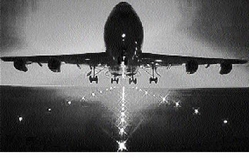As security tightens, business travel expected to falter
Published: Tuesday | December 29, 2009

New security restrictions swiftly implemented following a botched attempt to blow up an airliner on Christmas Day are making air travel more burdensome and could discourage some business fliers, key customers for the airlines.
Passengers will likely face longer lines at checkpoints and less freedom to move around the aeroplane during flight.
Leisure travellers, such as families who packed airports to return home on Sunday after the holiday, are likely to put up with the new inconveniences, as they have before.
But business travellers may think twice before flying if stepped-up security means spending hours at the airport.
That's troubling to the airlines because business travellers tend to fly frequently and pay higher fares.
Some business travellers could jump from the major airlines to smaller business jets to avoid wasting hours in the terminal every time they fly, said airline consultant Robert Mann.
The new security measures are "just going to add to the overall onerous way we have to conduct travel," said Kevin Mitchell, president of the Business Travel Coalition.
"No doubt it will dampen demand."
Making new procedures
Alarmed by the prospect of losing their best customers, airlines are already asking federal officials to make any new procedures palatable to passengers.
Tougher security measures were imposed after a man flying from Nigeria to Amsterdam then to the US on a Northwest Airlines flight last Friday tried to ignite an explosive as the plane prepared to land in Detroit.
On Sunday, police met another Amsterdam-to-Detroit flight after the crew reported a "verbally disruptive passenger".
A law-enforcement official said the man posed no security risk to the plane.
Government officials didn't detail the restrictions, saying they don't want terrorists to know about potential security measures.
They also declined to say how long the measures would be in effect and said the limits could vary from airport to airport.
Travellers on incoming international flights said during the final hour, attendants removed blankets, banned opening overhead bins and told passengers to stay in their seats with their hands in plain sight.
Authorities introduced a second layer of security at Pearson International Airport in Toronto. On Monday morning, every US-bound passenger was subjected to a pat down and their luggage was inspected by hand.
It took about three hours for travellers to get through the checks.
On one Air Canada flight from Toronto to New York's La Guardia Airport, the crew told passengers before departure that in addition to remaining in their seats for the duration of the one-hour flight, they were not allowed to use any electronic devices - even iPods - or their own headphones.
The crew also told passengers that they would not be able to access their personal belongings because of the "enhanced security procedures".
In Philadelphia, sisters Leslie and Lilliam Bernal said security was much tighter, as they returned from a wedding in the Dominican Republic, than it had been in September when they made the same trip.
Leslie, 26, of Keasby, New Jersey, said security screeners in Santo Domingo asked her to lift her long hair so they could look at her back.
"I don't mind at all," she said. "I'd rather them do what they have to do."
Leisure travellers "tend to be very accommodating of changes in the security regime," said Mann, the airline consultant.
"My concern is that business travellers are less so, because they buy high-priced tickets and expect to spend the least possible time waiting at airports."
No panic
There is no talk of panic, said Jack Riepe, a spokesman for the Association of Corporate Travel Executives. "We're not looking at massive cancellations," he said.
But Riepe said corporate travel managers want the government to explain how last Friday's suspect reached Detroit even though he was on a watchlist maintained by counterterrorism experts.
A government official said the suspect's father raised concerns about him to US officials several weeks ago, but the father's information about his son's possible ties to fundamentalist Islamic groups was too vague to act upon.
Darryl Jenkins, an airline industry consultant, predicted that any increase in airport lines would be temporary until security screeners become proficient at operating under new rules.
"This is disruptive, and we all hate it, but I don't think it's going to affect (travel) demand," Jenkins said. "Now if it had been a successful attempt, that would be something else."
US airlines have been appealing to federal officials to make restrictions effective but palatable to passengers.
They remember that passengers accepted tough new security measures immediately after the 2001 terror attacks, which grounded all flights for several days, but that support for the restrictions waned.
"Today that attempt on Friday is fresh in their minds," said David Castelveter, a spokesman for the Air Transport Association, a trade group for the largest US airlines. "As days and weeks and months go on, that memory fades and it becomes an inconvenience."
- AP



















